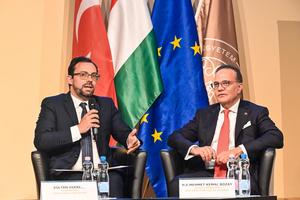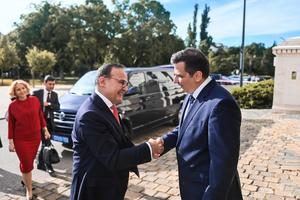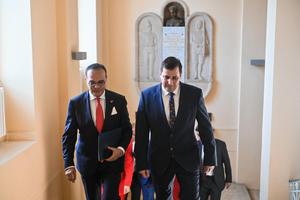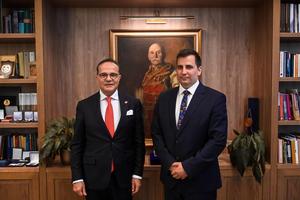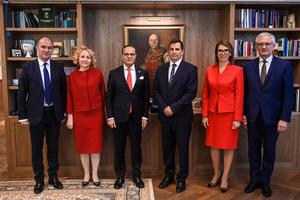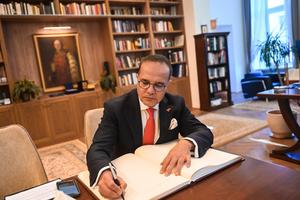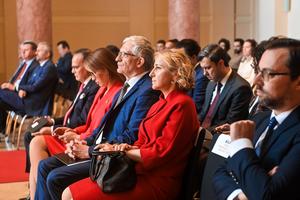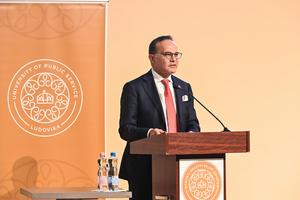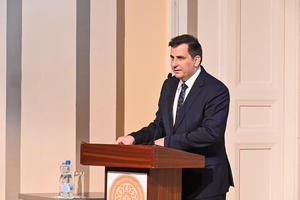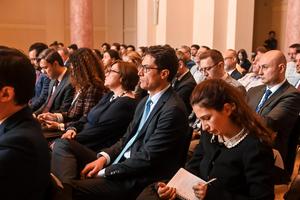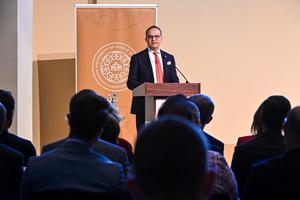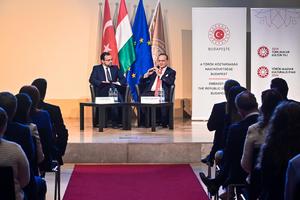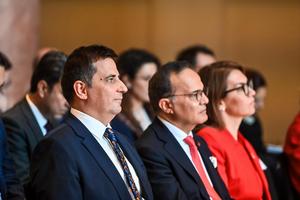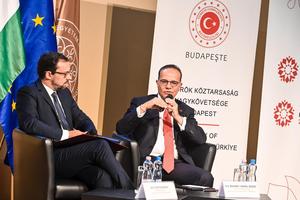Deputy Minister of Foreign Affairs, Mehmet Kemal Bozay spoke about Türkiye’s EU membership process on May 13, in St Ladislaus Chapel of the main building of Ludovika at an event organized by the Ludovika University of Public Service (LUPS) and the Embassy of Türkiye in Budapest.
Iván Gyurcsík, the rector's advisor for regional cooperation, highlighted in his welcome speech that the Hungarians already in the 19th century turned with sympathy towards the Turks of the time. In the period between the two world wars, many Hungarian engineers, scientists and state officials contributed to the development of Ankara. Last year we commemorated the centenary of the establishment of diplomatic relations between the two countries, and this year we celebrate the Turkish-Hungarian Cultural Season.
Gergely Deli, rector of LUPS, spoke about how our university, as the domestic knowledge centre of public administration, strives for students to acquire not only theoretical but also practical knowledge, i.e. gain insight into what is happening in the world. That is why it is important for the university to develop international partnerships, which includes the Ambassador Forum, as well as the Ludovika Scholars and Fellowship programs, the Stipendium Hungaricum scholarship, and the Erasmus and Erasmus+ mobility programs. The rector added that the university maintains mutually beneficial relations with dozens of Turkish universities and research institutes, so it regularly receives professors, researchers and students from Türkiye. It is worth deepening this bilateral cooperation - Gergely Deli concluded his speech.
After the greetings, Mehmet Kemal Bozay, Türkiye's Deputy Minister of Foreign Affairs and Director responsible for EU Affairs, gave a keynote speech on Türkiye's EU membership process and the Hungarian Presidency of the Council of the EU. As he said, our continent has been radically transformed, and the challenges of our time have no borders, so we can only find solutions together, along the principle of connectivity. As one of NATO's most powerful members, Türkiye protects Europe's borders and connects the continent with other regions, therefore it is an integral part of Europe. He emphasized that the Turks trust that the Hungarian presidency will be able to master the challenges and turn them into opportunities for the EU's enlargement. Zeitgeist indicates that we are at an important turning point. Europe has already missed a step on this point a few times, but the Turks hope that it will not make a mistake this time in connection with enlargement of the Union.
The Deputy Foreign Minister added that although Turkish-Hungarian relations are rooted in history, they are primarily looking to the future. Turkish society will never forget the solidarity and help it received from Hungary during the earthquake. Not only this year's joint cultural season is important, but also the coming year 2025, which will be dedicated to Turkish-Hungarian co-operation in the scope of science and innovation.
During the discussion following the presentation, the Deputy Minister of Foreign Affairs was asked by Zoltán Egeresi, a researcher of John Lukacs Research Institute of József Eötvös Research Centre. It has been said that, according to the majority of Turkish society, EU membership would be beneficial, but when if you ask whether Türkiye can become a member, the majority of respondents are pessimistic. However, our goal is common: to create peace, security and prosperity on the continent. Anything that happens in Europe today immediately affects the operation and economy of Türkiye . That is why it would be important to continue the accession negotiations, so that the obstacles rooted in the past, which are now considered anachronistic, can be removed and turned into collaboration. The compass which is needed in Brussels should be able to look around in 360 degrees, but show the way forward as well.
Mehmet Kemal Bozay is also confident that during the Hungarian presidency relations between his country and the EU will be developed in a way worthy of the challenges of the present and the future.
Text: Tibor Sarnyai
Photo: Dénes Szilágyi
